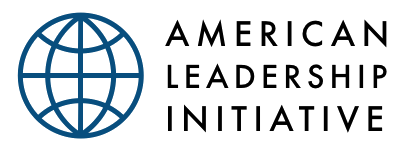American Leadership Initiative’s New China Paradigm
/The U.S.-China relationship is one of the key challenges facing America today. The current Administration has pursued a trade war that is quickly moving towards a cold war and economic disengagement that undermines American interests.
The United States must be tough on China’s predatory commercial practices and actions which undermine America’s national security and democratic values, while avoiding an acceleration of tensions, which could lead to a downward economic spiral with grave consequences for the U.S. and global economies.
Developing a new paradigm for the bilateral relationship is essential. The U.S. must take a smart and tough approach, working with its allies to protect and promote its national and economic security, while continuing to have negotiations with China where progress is possible and cooperate on global issues with China where our interests align. Part of a comprehensive China strategy must include domestic measures to enhance U.S. competitiveness. These domestic policies are not a focus for ALI, however, Third Way, the Aspen Institute and other organizations are doing important work in this area.
Outlines of a comprehensive China policy should include the following:
Work with Allies and Institutions
o The Trump Administration has correctly identified many of the challenges that China’s economic model poses but has pursued a “go it alone” strategy, which has pushed the U.S. and China into a trade war. The U.S. would have significantly more leverage in negotiations with China if it worked closely with the EU, Japan, Canada and other allies to develop a multilateral China strategy. The U.S. should vigorously pursue WTO cases against China’s market distorting practices, possibly including a broad nullification and impairment case against China’s WTO membership.
o The U.S. should reinstate bilateral discussion mechanisms, like the JCCT and the S&ED, which were often useful in addressing sector-specific regulatory and market access issues and served an important function of maintaining multi-level dialogs between the first and second largest economic powers.
Negotiate Agreements with Like-minded Countries
o Pursue high standard agreements with like-minded countries.
o The U.S. should negotiate terms for joining the Comprehensive and Progressive Agreement for TransPacific Partnership (the former TPP)
o The U.S. should resume negotiations for the Transatlantic Trade and Investment Partnership (TTIP) with the EU.
o The U.S. should negotiate a plurilateral, high-standards digital trade agreement outside the WTO, with U.S. standards of open and transparent trade and regulation.
Protect U.S. Technology
o Continue to pursue tightening of U.S. investment restrictions under the new Foreign Investment Risk Review Modernization Acct (FIRRMA) legislation.
o Require Chinese firms to disclose their ownership structure and funding sources before entering the U.S. market.*
o The U.S. government and private sector should work collaboratively to identify advanced technologies that would benefit from additional export control protection for national security reasons.
o Mandate transparency for U.S. educational and civil society institutions receiving Chinese government funding.*
Answer to China’s Belt and Road
o Increase foreign assistance to countries in the developing world to provide an alternative to China’s Belt and Road financing. This should supplement the new U.S. International Development Finance Corporations resources.
o Launch a “Digital Marshall Plan” to fund the acquisition of non-Chinese internet and ICT technology by developing countries., to give make it financially feasibly to purchase American technology, promoting both national security and American jobs.
o Work with allies to set up infrastructure investment transparency platforms that will gather project oversight information, such as lending terms, technology standards, and how the project will benefit local public interests (such as environmental and employment impacts), to encourage China’s BRI projects to meet international standards.*
Support the Rule of Law, including human rights
o The U.S. should address “corrosive capital” coming from China (and from other states such as Russia) that undermines the rule of law, democracy, and places American workers and businesses at a disadvantage in third country markets, both through domestic legislation as well as through agreements with like-minded countries.**
o Promote internet standards and norms which both support open and transparent standards to benefit U.S. companies as well as standards that protect against cyber-interference from authoritarian regimes.
o The U.S. should raise China’s human rights abuses both bilaterally and through international fora, particularly given the increased repression under President Xi, including the persecution of Chinese Muslims.
Cooperate where Interests Align
o Work with China collaboratively where our interests align. Key areas include:
o Climate Change and environmental technologies
o Pandemic research and coordination
o Humanitarian and disaster relief
o Anti-terrorism and other global security initiatives
Unleash U.S. Competitiveness
o Increase spending on U.S. government R&D spending on basic science as well as key technologies for the 21st century.
o Dramatically increase investment in education, particularly STEM education, to ensure that U.S. companies have access to adequate skilled labor.
o Develop training and apprenticeships programs for jobs of the future
o Update U.S. infrastructure, including digital infrastructure
o Expand export financing to support U.S. companies


